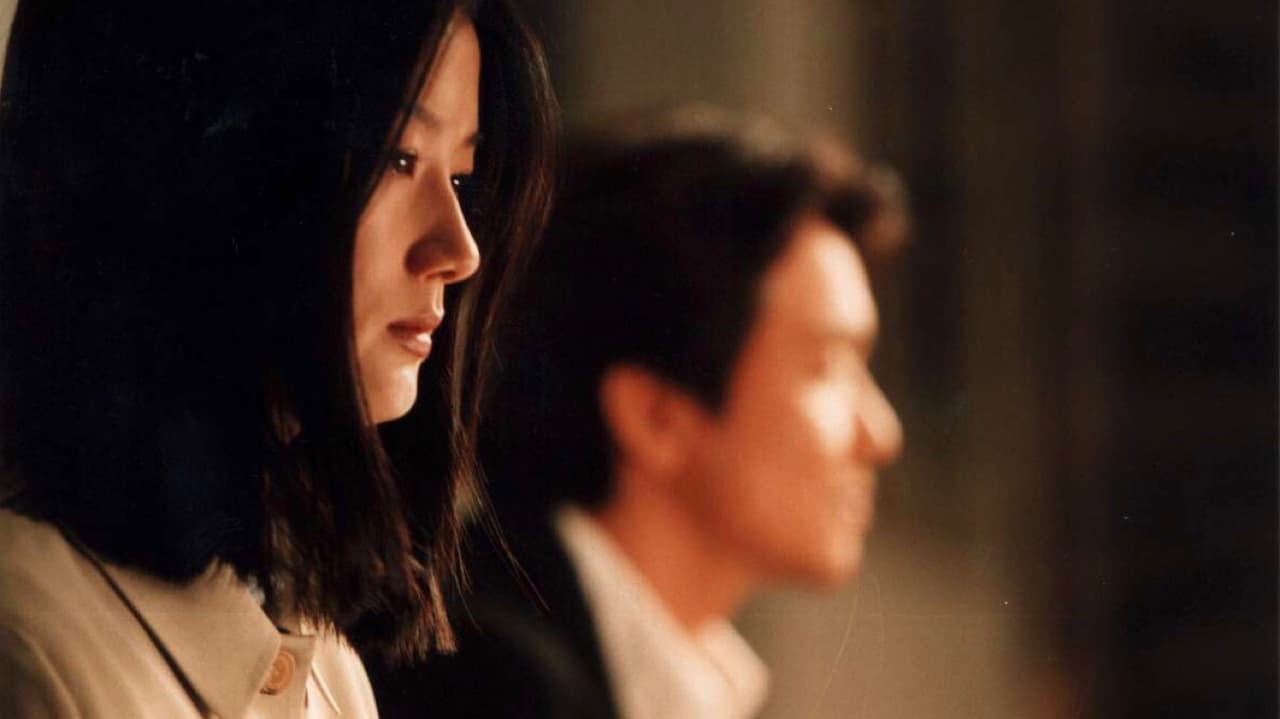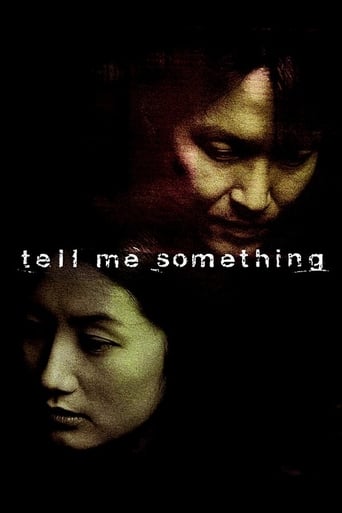



This Movie Can Only Be Described With One Word.
Save your money for something good and enjoyable
The plot isn't so bad, but the pace of storytelling is too slow which makes people bored. Certain moments are so obvious and unnecessary for the main plot. I would've fast-forwarded those moments if it was an online streaming. The ending looks like implying a sequel, not sure if this movie will get one
View MoreClose shines in drama with strong language, adult themes.
View MoreIn the second tier waterlogged Argento film Trauma (1993), a character stares at a print of John Everett Millais's 'Ophelia' (1852), and he seemingly stumbles over a clue. His vision is blurred from crying, and in a reflection in the glass he spies a stranger in black with a snake bracelet whom he mistakes for someone else. Young-hyun Chang uses this Argento sequence as his stepping off point to explore the blurred relationship between art and reality in 'Tell Me Something' (1999) aka Telmisseomding. A cloud hangs over the head of Lieutenant Cho, and how he paid for his mothers' medical expenses. "Why would Park pay an 85 million won bill for a detective trying to arrest him?" is the question an internal affairs investigator asks Cho. Although the question of being guilty of taking a bribe is not resolved, he does say to a colleague (Detective Oh) in one scene "I still don't know if I did the right thing." To which Oh replies "I'm sure you didn't want to go like that, but a decision had to be made."A key scene with seeing, watching, and different ways of being seen involves the questioning of Suyeon Chae. Through various devices such as telemonitors, and shots through internal windows, we see him looking at her, his partner looking at her, and her looking at a video, looking at pictures, and we know that she knows. She knows things.In a nod to 'Giallo' pulp fiction origins, Miss Chae after being installed in the Lieutenants house, finds a note; 'Call me if you need anything. There's a gun in the drawer.' In a neat piece of montage, we are lulled by a waltz as the Lieutenant shows Miss Chae how to use the gun, which is quickly followed by a sequence of mayhem on a freeway as a truck runs over one of the seemingly ubiquitous black garbage bags of body parts that are being dumped around the city.Miss Chae's friend Seungmin is a medical intern who seems like the most likely candidate from the get go; you know her cheery countenance is guilty. She wears white all the time, knows how to use a scalpel. Seungmin has long hair Chae short, Chae is artistic Seungmin scientific. And let's not forget this is influenced by Dario Argento who likes to have an alternate killer in the background.An okay waterlogged thriller whose opening credits features a painting reminiscent of Rembrandt's 'The Anatomy Lesson of Dr. Nicolaes Tulp' (1632), which sets up Argento's fresco concern. In the first visit to Miss Chae's house we see a postcard sized reproduction to John Everett Millais' 'Ophelia' (1852), used similarly in Argento's 'Trauma' and 'The Stendahl Syndrome'. Later, in Miss Chae's country family house, there is a painting depicting her as 'Ophelia' from the Millais, painted by her father.Argento like mise-en-scene can be found in an economically executed sequence in a crowded elevator, and another garbage bag full of body parts. The exterior of Miss Chae's fathers house is reminiscent of the empty house in Deep Red. Instead of the children's scrawl on the wall, we get a montage of photos of Miss Chae and a reproduction of the Rembrandt picture. Ultimately though, the idea of scopophilia, being sexual pleasure from looking gazing, is how Argento seeps through this work. Worth a look.
View MoreI watched the Korean film Tell Me Something last night and i thought it was an excellent film. The film starts of in In Seoul, where there are body parts found which do not match with the severed copses of three men that are found. They have been in cars and bags and public spaces around the city. Detective Cho, is under investigation of the discovery and is assigned to lead the investigation with his team. When the true identities of the men are discovered, the police finds that the artist Su-Yeon Chae, who lives with her friend Seungmin Oh, was a former lover of each of the men that have died. Detective Cho and his police force follows the leads on the information Su-Yeon tells them. I thought that this was a very good film which kept you gripped throughout. 7/10
View MoreOK, OK I'll tell you. Pretentious. Predictable. Preposterous. Exhibit A: cop finds out his pretty but sulky witness has attempted suicide several times, turns around and leaves her alone in his flat with his one and only gun, then goes after a serial killer without any weapon, gets mauled in the process, survives the ordeal, chases the killer a second time, this time still without any weapon... And just when you think it can't get any dumber than this, well, that's exhibit A, and as Picard puts it, "Plenty of letters left in in the alphabet"A thinking person's movie? I suppose it could be. I suspect a lot of people who spend their working hours thinking actually like to switch off their brains when they come home after a hard thinking day's work.
View MoreI must be the last to realise that Korean cinema is simply the freshest, most exciting and challenging cinema being made anywhere today. "Tell Me Something" illustrates beautifully some of the ways in which this is true. Starting with the time-honoured police thriller format, the way in which the drama plays out couldn't be more different from your average excellent but formulaic episode of "The Closer" or "Without a Trace"; as in much Korean cinema, the presumption of intelligence in the viewer means that far from being walked through every plot point, you tread the lonely road of clues and suspicion by yourself. Doubtless other viewers will predict the plot points with superhuman speed...still, I enjoy the spectacle even when I'm mystified.It feels as though the director has gorged himself on the full gamut of cinema, taking in not only his own cinema but glossy but predictable Hollywood and glorious, violent Japanese cinema. There's nothing more refreshing than to see a structure you recognise, used to portray a world you don't. It gives new life to any old, tired story or scenario better still when it's harsh and good-looking and violent and surprising, like this. Here's a very brief run-down: an artist's daughter, some lovers, some murders, dismemberment. Your guide through this murky world is Detective Cho (Suk-kyu Han), who stumbles along the policeman's dirty path, labouring under suspicion and dishonour. You learn that his impassive taciturnity conceals more complex emotions, and you accompany him as he unpicks a messy, bloody and tangled knot of relationships and lies, seeking redemption along the way.It's romantic at heart. Detective Cho reminds me of Dana Andrews' terse, detached detective McPherson, in Otto Preminger's haunting "Laura" of 1944. That tough character finds himself lifted by the aura created by the eponymous central character of Laura into an unfamiliar realm, falling in love with her as he begins to know her. The comparison ends there "Tell Me Something" has a finale that suits very modern tastes. I'm knee deep in Dashiell Hammett at the moment, but this is really more James Ellroy territory. It's a bit gory for my taste, but not strictly speaking gratuitous, I think. Even if it were, it would still be engrossing and disturbing, crafted with care and with a fantastic soundtrack.For more Korean excellence try gripping thriller "Memories of Murder" or the exquisitely turned "Spring, Summer, Autumn, Winter...and Spring". For other non-US excellence go for French TV policier "Engrenages" and Takeshi Kitano's unique Japanese gangster flick "Sonatine".
View More